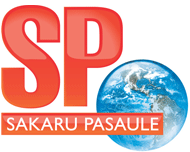|
ANNOTATION Autumn is a harvest time when not only fruits and potatoes, but also ripe ideas are gathered: it is the right time for conferences and exhibitions. Several international communication and e-business conferences as well as the exhibition Sakari 2000 are going to take place in Riga. But the leading theme of the present issue of Sakaru Pasaule is mobile communications - not only new mobile phones and WAP phones, but also mobile access solutions for office communication equipment, laptops and LAN. Enjoy new mobile advantage and the exciting communication with the world of communications! In this issue:· The new Apollo portal (page 16)By the end of August a new Internet portal was launched by the Apollo team of Lattelekom. It comprises traditional elements characteristic to many popular portals (searcher, free e-mail system, personalization), but the main value of the new Apollo portal are original articles, interviews and fresh information that one can find in e-magazines of Apollo. The users of Apollo portal are welcome to express their views in Discussion site. One of the goals is to form an interactive environment for open-minded young people that hopefully could lead to formation of a popular gathering site, wherein the portal users could not only read local and international news, but also get acquainted with opinion of experts.· Latvia on a way to digital TV (pages 23 - 25)Latvian State Radio and Television Centre (LVRTC) is preparing all the audio and video systems for introducing digital TV standard in Latvia. There are several important advantages of DTV: significant improvement of picture and sound quality; vast prospects for using various interactive multimedia home platform services (like video-on-demand, training, TV shops etc.); cheaper and environment-friendly transmission system; more rational usage of frequency spectrum.
Seven EU states, including Germany and France, will begin DTV transmission until 2002, experimental digital broadcasting takes place also in Eastern Europe in Slovakia, Check Republic and some others. It is clear that DTV is inevitable also in Latvia, the only question is - when it will happen and how much it will cost.
· International communications - a new phase of development (pages 58 - 59) Lattelekom has already reached the level of the United Kingdom as the company works with similar technologies and it has perfect co-operation with telecommunication operators throughout the world. An international call minute from Latvia to the USA and UK costs less than from these countries to Latvia.
Lattelekom has introduced such international services as International free call (an international analogue to the 800 services) and Home Country Direct. Lattelekom provides these services to all direct traffic countries. Another international free call service Universal call hopefully will be launched in Latvia during the first quarter of the next year. It will have a constant phone number that will be valid in all the countries.
· Mobile freedom of Wireless LAN (pages 70 - 71)Networks are increasingly being used to store all types of information, which presents its own challenges to the concept of mobility. Users are travelling more and teleworking more yet still demand access to their corporate information system no matter what is their location.
Nokia mobile strategy Global IP Mobility and Operator Wireless LAN access solution effectively makes a users desktop portable, allowing access to multiple media. This freedom of mobile laptop connectivity is one of the main building blocks of the emerging Mobile Information Society.
· Who rules the communication world? (pages 84 - 85) Motorola was one of the first companies transforming voice into digital packets for communication via computer networks. It is also the pioneer in producing video surveillance/observation systems, that allow to transmit a video image from long distance together with voice and data packets, using a low speed (2,4115Kb/s) communication channel. One of the most popular is Motorola video surveillance and guarding system. It was successfully used also in Latvia during the recent Song Festival of Latvian schools. · Bluetooth allows to forget wires and cables (pages 98-99)Bluetooth is a specification of radio technologies that is used for voice and data transmission by means of wireless channels. A user of laptop may send and receive e-mails by means of mobile phone even without taking it out of ones pocket. This technology simplifies the mutual co-operation of mobile systems and communication devices, as well as wireless access to Internet resources.
Ericsson Bluetooth device is very simple and light - it weights only 20 grams and reminds an ear-phone with a mike that functions within a 10 metre distance from the mobile phone. To answer a call one have to press a mike button, but to make a call, the required number is activated by means of voice command.
It is planned that by 2002 millions and millions of electronic devices will enjoy the advantages of built-in Bluetooth technology. Several computer companies have elaborated PC and USB cards with Bluetooth technology for laptops as well as multimedia information transmission interfaces and other advanced designs. Ericssons subsidiary Anoto already offers a unique solution: sending a hand-written information to Internet by means of mobile phone.
|
|



